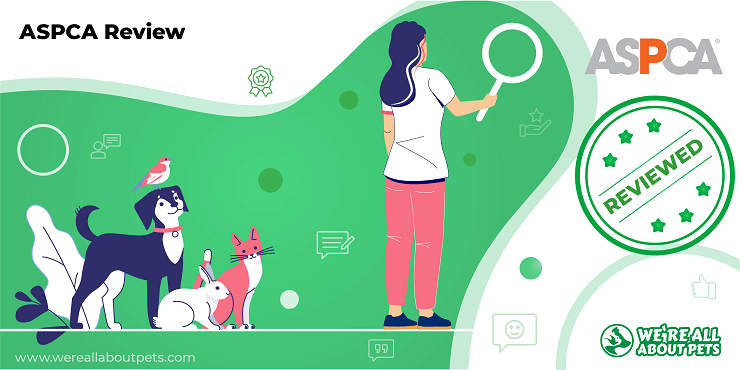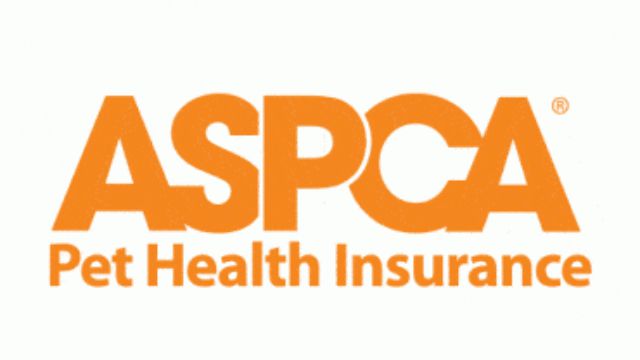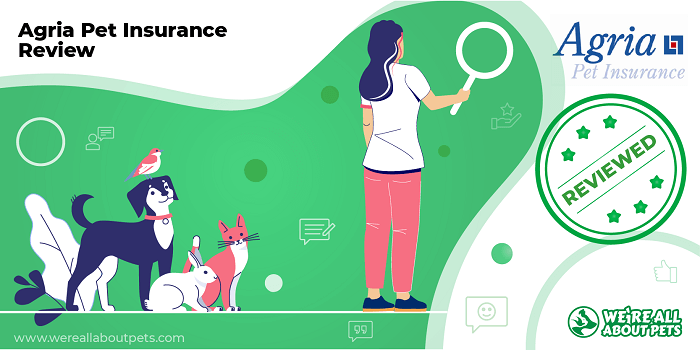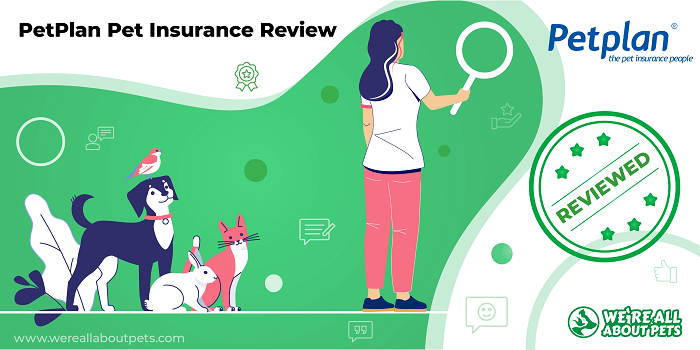ASPCA Pet Insurance Review
This page contains affiliate links. We may earn money or products from the companies mentioned in this post through our independently chosen links, which earn us a commission. Learn More

You never know when your pet might get sick or have an accident. In moments like these, it pays to have the backup of a pet insurance plan. Pet insurance is similar to health insurance for humans in that it helps reduce your out-of-pocket costs for unexpected veterinary expenses.
When it comes to pet insurance, it’s important to shop around. Prices vary greatly depending on location as well as the type and age of the pet you want to insure. ASPCA offers two different plans with optional preventive care coverage, all customizable according to your needs.
Read on to learn what you need to know about ASPCA insurance to decide if it’s the right option for you.

- Customizable Plans. Choose from 4 annual limits, 3 deductibles, 3 reimbursement levels.
- Short Waiting Period. Only a 14-day waiting period for accidents, illnesses, and knee/ligament conditions.
- Optional Wellness Coverage. Add optional coverage for preventive care to your plan.
- Fast Payment. Most claims are paid within 8 to 9 business days.
- Transaction Fees.You’ll be charged $2 per transaction for monthly, quarterly, or annual payments.
- Limited Changeability. You may not be able to change or add to your plan until the next 12-month period begins.
- Poor Customer Service. Some customers report low reimbursements and issues with customer service representatives.
- Customizable Plans. Choose from 4 annual limits, 3 deductibles, 3 reimbursement levels.
- Short Waiting Period. Only a 14-day waiting period for accidents, illnesses, and knee/ligament conditions.
- Optional Wellness Coverage. Add optional coverage for preventive care to your plan.
- Fast Payment. Most claims are paid within 8 to 9 business days.
- Transaction Fees.You’ll be charged $2 per transaction for monthly, quarterly, or annual payments.
- Limited Changeability. You may not be able to change or add to your plan until the next 12-month period begins.
- Poor Customer Service. Some customers report low reimbursements and issues with customer service representatives.
About ASPCA Pet Insurance
The American Society for the Prevention of Cruelty to Animals (ASPCA) was the first humane society established in North America and is now one of the largest in the world.
The ASPCA was founded on the belief that animals are entitled to respectful treatment at the hands of humans and they offer a wide range of programs and initiatives that support that mission. In addition to working directly with animals, ASPCA offers their own pet insurance underwritten by the United States Fire Insurance Company, produced and administered by C&F Insurance Agency, Inc.
Here are some of the benefits ASPCA pet insurance has to offer:
- Customizable coverage for your pet
- Choose from complete or accident-only coverage
- Reimbursement rates up to 90%
- Submit claims online, by mail, or by fax
- Visit any vet, specialist, or emergency clinic
- Have reimbursements direct deposited or mailed
Every pet insurance company is different, so it’s important to do your research before choosing a plan. Read on to learn the basics about ASPCA, their plans, and their coverage.
How Does ASPCA Pet Insurance Work?
With pet insurance plans like ASPCA, you pay a monthly premium in exchange for coverage. To use the plan, you simply go to your veterinarian and pay for services as you usually would. Then, submit a claim online or using the mobile app to receive reimbursement for covered costs.
Reimbursement levels range from 70% to 90%, as do annual claim limits and deductibles. You can customize your plan when you request a quote to choose the appropriate option.
Here are the details you need to know for ASPCA pet insurance:
-
Pet Insurance Plans
When it comes to their pet insurance plans, ASPCA offers two options: Complete Coverage and Accident-Only. There is also an add-on option for preventive care, which we’ll talk about later.
The ASPCA pet policy covers the following major categories:
- Accidents – This covers the cost of injuries and emergencies related to accidents (ex: torn ligaments, bite wounds, broken bones, toxic ingestion, etc.).
- Illnesses – This covers the costs associated with major and minor illnesses such as cancer, arthritis, allergies, digestive issues, and UTIs.
- Hereditary/Congenital Conditions – This covers the cost of inherited conditions and birth defects that don’t show symptoms until later in the pet’s life like IVDD and heart disease.
- Behavioral Issues – This covers the cost of visits concerning behavioral issues related to anxiety or compulsive behaviors (like licking, fur pulling, and destruction).
Here’s a quick review of the coverage ASPCA pet insurance offers:
| Accidents-Only Coverage | Complete Coverage | |
| Accidents | X | X |
| Illnesses | X | |
| Behavioral Issues | X | |
| Hereditary/Congenital Issues | X | |
| Dental Disease | X | |
| Pre-Existing Conditions | ||
| Cosmetic Procedures | ||
| Breeding Costs | ||
| Preventive Care |
No pet insurance plan covers pre-existing conditions, so it’s important to do your research to determine what falls under this category for ASPCA insurance. You should also know that cosmetic procedures and breeding costs are not covered. Preventive care is not covered unless you purchase an additional plan.
-
Pricing
The cost to purchase pet insurance varies depending where you live, what type of pet you have, and how old your pet is. It’s usually the most cost-effective to cover a pet over 1 year old that has already been spayed/neutered and had their initial vaccines. The older your pet gets, the most prone he may be to illness which could equate to higher premiums.
The best way to find out how much ASPCA pet insurance costs is to request a quote. To give you an example of two different pets, we’ll use a 3-year-old mixed-breed male dog weighing 50 pounds and a 2-year-old female mixed-breed cat.
Here’s the breakdown of the dog plan pricing:
Accidents-Only Coverage |
|||
| Reimbursement % | Annual Reimbursement Limit | Annual Deductible | Monthly Premium |
| 70% | $3,000 | $100 | $20.27 |
| 70% | $5,000 | $250 | $20.58 |
| 70% | $10,000 | $500 | $23.71 |
| 80% | $3,000 | $100 | $22.64 |
| 80% | $5,000 | $250 | $22.92 |
| 80% | $10,000 | $500 | $26.34 |
| 90% | $3,000 | $100 | $24.85 |
| 90% | $5,000 | $250 | $25.05 |
| 90% | $10,000 | $500 | $28.54 |
Complete Coverage |
|||
| Reimbursement % | Annual Reimbursement Limit | Annual Deductible | Monthly Premium |
| 70% | $3,000 | $100 | $39.64 |
| 70% | $5,000 | $250 | $36.76 |
| 70% | $10,000 | $500 | $42.19 |
| 80% | $3,000 | $100 | $44.08 |
| 80% | $5,000 | $250 | $40.73 |
| 80% | $10,000 | $500 | $46.40 |
| 90% | $3,000 | $100 | $48.19 |
| 90% | $5,000 | $250 | $44.33 |
| 90% | $10,000 | $500 | $50.14 |
Here’s the breakdown of the cat plan pricing:
Accidents-Only Coverage |
|||
| Reimbursement % | Annual Reimbursement Limit | Annual Deductible | Monthly Premium |
| 70% | $3,000 | $100 | $12.17 |
| 70% | $5,000 | $250 | $12.53 |
| 70% | $10,000 | $500 | $14.77 |
| 80% | $3,000 | $100 | $13.46 |
| 80% | $5,000 | $250 | $13.81 |
| 80% | $10,000 | $500 | $16.21 |
| 90% | $3,000 | $100 | $14.67 |
| 90% | $5,000 | $250 | $14.97 |
| 90% | $10,000 | $500 | $17.43 |
Total Coverage |
|||
| Reimbursement % | Annual Reimbursement Limit | Annual Deductible | Monthly Premium |
| 70% | $3,000 | $100 | $19.12 |
| 70% | $5,000 | $250 | $17.51 |
| 70% | $10,000 | $500 | $19.63 |
| 80% | $3,000 | $100 | $21.35 |
| 80% | $5,000 | $250 | $19.46 |
| 80% | $10,000 | $500 | $21.67 |
| 90% | $3,000 | $100 | $23.45 |
| 90% | $5,000 | $250 | $21.29 |
| 90% | $10,000 | $500 | $23.54 |
On top of your monthly premium, you’ll be charged $2.00 for each transaction. You can choose to pay monthly, quarterly, or annually. You can save by adding multiple pets.
-
Waiting Periods
Pet insurance plans often require waiting periods to reduce the risk of insurance fraud. Basically, you can’t purchase a plan knowing your pet is sick and then expect the plan to cover the cost.
For ASPCA, the only waiting period you really have to worry about is the initial 14-day waiting period. Your plan will become effective the day following your enrollment and you’ll be able to start submitting claims 14 days later. The exception is for preventive care plans which start immediately.
-
Claim Limits
Many pet insurance companies set a limit on the amount you can request reimbursement for per accident or illness. At ASPCA pet insurance, you can choose from four claim limits when you sign up for your plan: $3,000, $5,000, $7,000, or $10,000. These are annual limits, so they renew each year. Choose carefully, however, because if you raise your coverage limit later it will require you to start a new plan and anything your pet has been treated for will be considered pre-existing for that plan.
There is no limit to the number of claims you can submit with ASPCA pet insurance – you just have to submit them within 270 days of your pet’s visit to the veterinarian.
-
Deductibles
A deductible is the amount you pay for covered services before the plan starts to offer reimbursement – deductibles are on top of your monthly premiums. These deductibles may be paid in a single service or spread out over several, depending on the amount.
For example, if you have a $500 deductible and the cost for your pet’s first visit is $230, you’ll be responsible for the full cost. If your pet’s second visit amounts to $600, you’ll be responsible for $270 and then the remaining $330 will be reimbursed at your pre-determined reimbursement level.
As ASPCA pet insurance, there are three different deductibles: $100, $250, or $500. You can choose your deductible when signing up for your plan. These deductibles renew each policy year – you do not pay the deductible for every claim.
-
Pre-Existing Conditions
No pet insurance company covers pre-existing conditions. Like the waiting period, this policy is in place to prevent pet owners from purchasing and using a plan knowing their pet is sick. What makes ASPCA different from some companies, however, is that they may cover cured conditions. If your pet has a pre-existing condition but recovers, the condition may later be covered.
Here’s what ASPCA has to say about it:
“Pre-existing conditions are injuries or illnesses that come up or show symptoms before your plan goes into effect or during a waiting period. Like most pet insurance plans, Complete Coverage does not cover pre-existing conditions. However, these conditions may be covered in the future if they can be cured and free of symptoms and treatments for 180 days.”
To determine if your pet has any pre-existing conditions, you may be required to submit information about your veterinarian following enrollment. Your pet needs to have been seen within 12 months of enrolling in the plan to determine if any pre-existing conditions are present.
-
Optional Coverage
ASPCA’s Complete Coverage plan doesn’t include preventive care coverage. This refers to things like your pet’s annual check-up along with vaccinations, flea and heartworm prevention, and spay/neuter surgery. If you want to add coverage for these things, however, ASPCA has two options:
- Basic Preventive Care ($9.95/month)
- Prime Preventive Care ($24.95/month)
Here’s what ASPCA says about their preventive care coverage:
“If you chose to add preventive care coverage to your plan, it covers a list of services with set annual reimbursement amounts. Claims for covered preventive services can be submitted the same way as other claims… If you don’t have preventive care coverage, you can add it when your plan renews.”
Here’s a list of what preventive care coverage includes:
Heartworm test or FELV screening
- Spay/neuter surgery and/or dental cleaning
- Rabies vaccine/titer
- Lyme or FIP vaccine/titer
- Annual veterinary exam
- Urinalysis and blood screening
- Heartworm/flea prevention
The important thin to remember about ASPCA preventive care plans is that you’ll receive a set reimbursement amount for covered services. There are no deductibles or co-insurance for these two plans, but the amount you get back from the plan is set at a certain amount. These benefits generally range from $20 to $150.
-
Pets Covered
ASPCA currently only offers coverage for cats and dogs. Your quote will be customized according to your pet’s age and your location.
ASPCA Customer Reviews
When shopping for pet products, it’s always a good idea to hear what customers have to say. This is particularly true for pet insurance because it’s a big investment. You may not realize an important detail about the plan until you go to use it. Do yourself a favor and dig deep with your research, starting with reading the good and bad things actual customers have to say about ASPCA.
Here are some positive reviews and negative reviews from real customers:
Positive Reviews
“Claims are responded to very quickly. No problems, no headaches. Claims are easy to submit and monitor online, making the process simple. Very happy with ASPCA Pet Insurance and would recommend to anyone with a pet. My dog has been having health issues and having ASPCA Pet Insurance gives us peace of mind.”– Ashley of Darien, CT
“ASPCA’s pet health insurance has been a great deal for us. I purchased it for our remaining cat after one of our two cats died of pancreatic cancer last summer. Several months later the remaining cat became sick with feline lymphoma and we unfortunately had to make many visits to the vet for treatment, testing, etc. The insurance reimbursements saved us a lot of money in vet bills, as well as giving us peace of mind, and was very easy to use. Generally, payments were made within a few weeks of submitting a claim, and all of our claims were easily managed from the web interface.”- Rand of Nashua, NH
Negative Reviews
“After 3 months They keep sending me emails every two weeks about needling more info from my vet. My vet sent them 11 pages of records 4 times. I spoke to a rep EVERY WEEK since the surgery (July 27 2020). They say they don’t have them, then another rep says they do then again they’re waiting. I’ve called and shown up at my vet’s office 3 times to make sure they did their part and sure enough they did. I again call ASPCA pet insurance and wait the 40-over an hour wait times to be told the same things.”- Peter of Bridgeport, CT
“My dog Toto was insured by ASPCA Pet Insurance (underwritten by The Crum & Forster group) for over 10 years. Paid around 10000 in insurance premiums over 10 year period. When my dog needed an ACL surgery, the company has denied my claim, stating that incident has occurred in the prior policy year. Company is saying that when policy is renewed each year, treatment for the incidents that happened in the prior year would not be covered.” – Igor of Mendham, NJ
How Do You Sign Up?
Signing up for pet insurance is usually pretty simple – you just request a quote customized to your pet’s details and then submit your payment. ASPCA pet insurance is just as easy.
Here’s the information you’ll need to provide:
- Your pet’s name and species
- Your home zip code
- Your pet’s breed, age, and sex
- Your email address
Once you’ve submitted this information, you’ll be taken to a page where you can customize your quote. Choose from the different options in annual deductibles, annual claim limits, and reimbursement percentages. When you’ve chosen your plan, you’ll be taken to the next page where you can elect optional preventive coverage and add more pets.
When you’ve finalized your plan selections, the last thing you need to do is provide your billing and payment information. Your plan will become effective the 15th day after enrollment.
Is ASPCA Pet Insurance Worth It?
Being a pet owner can be expensive, especially when it comes to accidents and unexpected injuries. ASPCA pet insurance can help give you peace of mind knowing you have a backup plan. Keep in mind, however, that you’ll be expected to pay your monthly premium whether you use the plan or not.
If you’re wondering whether pet insurance like ASPCA is worth it, you have to think long-term over the life of your pet. Your premiums will be lowest when your pet is young and healthy. You may think this is exactly when you don’t need coverage, but the longer you wait the more likely it is that your pet will develop conditions a pet insurance company will consider pre-existing. If you plan to get pet insurance at some point, it may be better to do it earlier than later.
All that being said, there’s no guarantee that pet insurance will be worth it. You may end up paying thousands of dollars in premiums to never use the plan. If you’re on the fence or your pet is very healthy, it may be worth it to simply put away in savings what you’d pay in monthly premiums just in case something comes up in the future.
Click Here to Get A Quote on ASPCA Pet Insurance
Frequently Asked Questions
Who owns ASPCA pet insurance?
ASCPA pet insurance is underwritten by the United States Fire Insurance Company, produced and administered by C&F Insurance Agency, Inc.
How to cancel ASPCA pet insurance?
You can cancel your ASPCA pet insurance at any time by contacting the company by phone. Your cancellation will take place either that month or the following month, depending on your billing date.
Does ASPCA pet insurance cover cremation?
Many pet insurance companies cover the cost of euthanasia when related to an accident or injury but may not cover cremation or burial. This is the case for ASPCA pet insurance.
Does ASPCA pet insurance cover hip dysplasia?
Yes, ASPCA covers diagnostics and treatment related to hip dysplasia as long as it isn’t a pre-existing condition.
Does ASPCA pet insurance cover allergy testing?
Yes, ASPCA covers diagnostics and treatment related to allergies as long as it isn’t a pre-existing condition.
Does ASPCA pet insurance cover blood work?
Yes, ASPCA covers diagnostic testing like blood work. Just be sure you have the Complete Coverage plan, however, or you may only have blood work related to accidents covered.
Does ASPCA pet insurance cover dental?
Yes, ASPCA covers accidents and illnesses related to dental issues but you’ll need to add preventive care coverage if you want to be reimbursed for dental cleanings and routine care.
Does ASPCA pet insurance cover emergency visits?
Yes, ASPCA pet insurance covers emergency visits. Just be sure you have the Complete Coverage plan, however, or emergency visits only related to accidents may be covered.
Does ASPCA pet insurance cover neutering?
No, this plan doesn’t cover the cost of spay/neuter surgery. If you add preventive care coverage, however, you may receive reimbursement up to $150 for this surgery, depending on your plan.
Does ASPCA pet insurance cover medication?
Yes, ASPCA covers the cost of prescription medication for covered services. Again, if you have Accident Only coverage, only medication for accident-related injuries will be covered.
Does ASPCA pet insurance cover prescription food?
Yes, ASPCA covers the cost of prescription food related to covered services. This doesn’t apply to prescription food for general maintenance or weight management.








